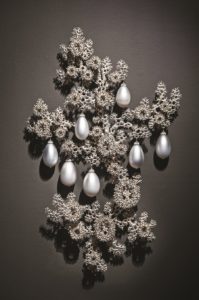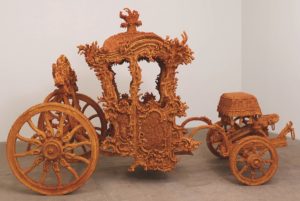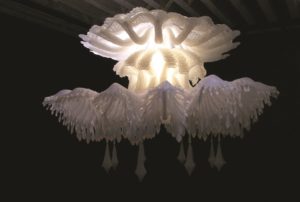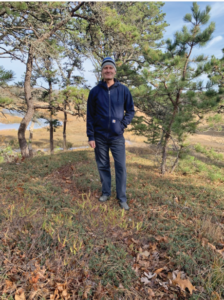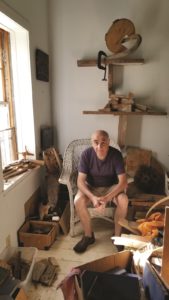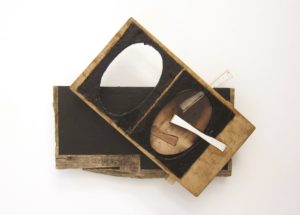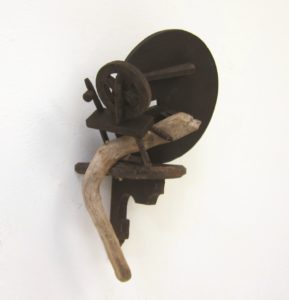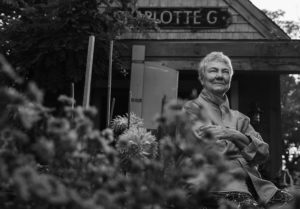Rehab El Sadek has made herself at home since arriving in Provincetown this past October as a visual arts fellow at the Fine Arts Work Center.
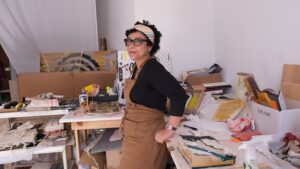
The vibe in her narrow studio is equal parts industrious and homey. She has divided the space with a sheer curtain; behind it is a desk where her partner, an arts administrator and writer, can also work. The couple have adopted a cat, and El Sadek says they’re getting married this month at Race Point Beach.
She’s also found a sense of family in the other fellows, often cooking for them. “They are like my children,” says El Sadek of the other artists and writers, many of whom are a generation younger than her. “As somebody who became an immigrant at an older age, I don’t have community here, so I go to residencies to know people and know other artists,” she says.
El Sadek, who is originally from Egypt, has been based in Austin, Texas for 17 years. She moved there with her son and now ex-husband so that he could complete a master’s degree. “Every time we went back to Egypt, we thought we would stay, but Egypt became harder and harder for a family,” says El Sadek.
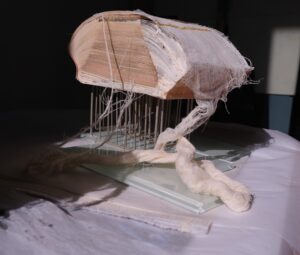
Her artwork — which encompasses sculpture, painting, and installation — has been a way for her to process the immigrant experience and grapple with understanding American culture.
“It’s really hard when you don’t understand where you are, especially when your work is social,” she says. In Egypt, her work addressed topics such as gender and the history of stolen artifacts — social issues tethered to the context of the culture. In America, El Sadek had to find a home not just for herself but also for her art.
In the front of her studio hangs a sculpture composed of a book stripped of its pages. It’s placed vertically and partially covered with gauze that hangs from the bottom like folds of loose skin. On one of the inner covers, El Sadek repeatedly stitched the phrase “hush.” It’s a delicate touch, matching the auditory softness of the word but contrasting with the grime and violence of the destroyed book.
For El Sadek, it reflects her deep unease with honestly expressing herself. “I have been afraid to communicate how I feel, especially politically,” she says. “Not everybody accepts your opinions.”
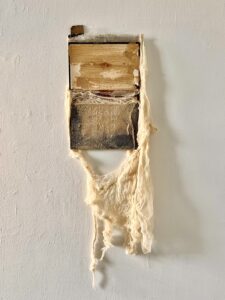
When El Sadek arrived in Provincetown in the fall and the violence in Israel and Gaza began, she was struck anew by the dissonance between her political opinions and those of many Americans. She participated in demonstrations with other FAWC fellows against the war.
“There were people with visas with us,” she says. “ ‘What if something happens?’ we thought. Of course, nothing happened in Provincetown, but it brings up all this awareness about vulnerability. I’ve been feeling that for years and years.”
This sense of cultural and political homelessness eased somewhat this past year when El Sadek received her American citizenship. “I am less worried when I sleep at night,” she says.
During her fellowship, books — which she has used intermittently in making art since 1997 — have served as her primary material. She picks them up at thrift shops and in the discard pile at the library and starts stapling, hammering, and gluing pages together.
On a wall in her studio, she displays a group of finished sculptures. Some are no longer legible as books, like A Day Over the Night | A Night Over the Day, stained red with pigments she brought back from Egypt. It looks like a rock or archaeological fragments held together with strands of gauze. Other sculptures maintain their forms as books but are materially transformed. Delicate pages congeal into hard, cement-like forms. Other books feel light and airy, entombed in white plaster or layers of gauze.
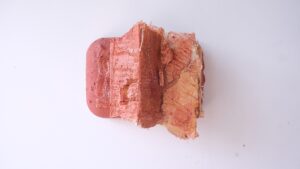
Gauze is the one material that seems to appear in all her artwork. “I’ve been using gauze for a long time because it’s really beautiful and has layers of meaning related to protection and restoration,” says El Sadek.
It’s also a reference to her culture. She locates the roots of her creative practice in a visit to a room in the Cairo Museum with ancient Egyptian sarcophagi. She was struck by the materials and colors, the designs on the coffins, and the mummified bodies delicately wrapped in gauze.
The books she collects — written in English and bearing titles like The Diffusion of Power — are a reference to her present and her past. She grew up the daughter of a public relations officer for the Egyptian government in a home outside Alexandria filled with books.
“Reading was my entertainment,” says El Sadek. The books — like her family’s worldliness and later her art education at Alexandria University — became a portal to a broad understanding of culture.
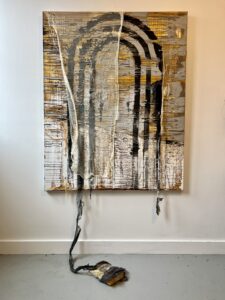
In America, the books she finds are keys to understanding American culture, but she transforms them into something that belongs to her. She challenges their authority, leaving some pages legible but covering others with gauze, soil from her homeland, and the Arabic script of her native language.
“I can use the book form to tell a story that is autobiographical,” says El Sadek, “but not just about myself — about immigration.”
El Sadek says that when she goes back to Egypt now she feels as if she doesn’t fully belong there. “When you leave your own country, you hold onto the past,” she says. “The Egypt I remember is from 17 years ago, but the culture is moving.”
The books exist in a similar state. There’s plenty of nostalgia in her surfaces, but it’s displaced from its origin and transposed onto a foreign substrate. In El Sadek’s sculptures, beauty, cultural expression — and maybe a sense of home — exist in forms of hybridity.
Forms of Hybridity
The event: A showcase with fellows Rehab El Sadek and Sasha Wortzel
The time: Friday, April 19, 5 to 8 p.m.
The place: Fine Arts Work Center, 24 Pearl St., Provincetown
The cost: Free
